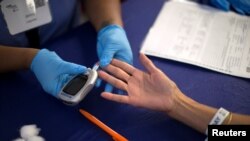Scientists have discovered that a protein that plays a crucial role in healing broken bones is not fully functional in diabetics. By applying the protein directly to fractured bones, researchers showed they could improve the healing and strength of bones in diabetics.
Researchers at Stanford University School of Medicine in California found that a protein called "hedgehog" helped mend bones in diabetic mice by stimulating the activity of skeletal stem cells.
Michael Longaker, a professor of surgery and co-director of the Institute for Stem Cell Biology and Regenerative Medicine at Stanford, helped make the discovery and co-authored a study on the topic, published in the journal Science Translational Medicine.
Longaker said the protein, when functioning properly, has the potential to address a serious problem in diabetics, whose bone problems are among the worst that doctors see.
"As diabetes is exploding worldwide in terms of its incidence, I think this becomes more important as we have an aging population with diabetes," he said.
Researchers studying a mouse model of diabetes noted that the animals had significantly lower numbers of skeletal stem cells to repair bone fractures. When the bones did finally heal, they were weaker and less dense than those of non-diabetic mice.
Poor signaling
In experiments, the researchers found that although the reduced numbers of stem cells were themselves fully functional, there was a problem with hedgehog proteins near the site of a bone break: They, too, were fewer in number and were only weakly signaling the master cells to repair broken bones.
Excessive inflammation, the researchers found, was weakening the hedgehog proteins in the diabetic mice. They discovered that they could improve hedgehog proteins' signaling by increasing their numbers. To accomplish that, they developed a gel containing more hedgehog molecules that could be applied to broken bones.
Longaker said that when applied directly to the inside of broken bones, the gel helped with repairs in diabetic mice, and in healthy rodents as well. The release of the extra hedgehog proteins is need for only a short while, he added. Over three to four weeks, "it did rescue the fracture healing."
Hundreds of millions of people around the world suffer from diabetes, which causes a host of serious complications, including kidney failure, blindness and heart disease. The protein discovery could someday ease one serious complication for diabetics.




